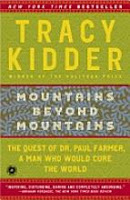
This one was a true story about a man called Paul Farmer who has had a lot of success in improving public health for the poor. It all began when he went to Haiti during college, and was appalled. Impressively, bit by bit, he managed to set up an extremely good public health system in a very poor area in Haiti. His work spread to other countries, and he’s had a wide impact. Apparently the way in which TB was being treated globally was encouraging the development of MDR (multiple drug resistant TB) which is obviously very dangerous. The central problem in treating it was that the drugs were deemed too expensive, and managing patient lifestyles (food security, etc etc) too difficult. He managed to get the drugs made cheaper, and also entirely shift the paradigm for what was possible in monitoring patient lifestyles.
So all very impressive. He is really dedicated to the idea that you ought to work for the poor, because that’s a good in itself, a clear area of moral clarity. He doesn’t think you should work for money, or even for a feeling of personal efficacy (which was interesting, as I’d just been feeling jealous of just that aspect of his life!). In fact, he himself feels deeply guilty when not focused on working for the poor. I have often noticed that when Americans come to Africa they are amazed by the poverty. They can’t believe it is possible, or should be allowed. They just think it shouldn’t be possible, and is some kind of insult to the world. Which is maybe the right way to see it, but it’s also a very first world, naïve view. But whatever. He still saved thousands and thousands of peoples lives. You can’t argue with that.
Well maybe you can a little bit. It was an interesting book, but I had a couple of difficulties with it that made it a slightly uncomfortable read. For one thing, I’m not really sure I think that much money should be being spent on health. I’m not sure that there’s any point in just keeping people alive, basically through donations, without creating jobs, environmental sustainability, political stability etc. You shouldn’t just be pumping up population levels, because that will just make all the other problems worse, which will mean more issues for health, and thus more donations etc etc. So I’m not sure it’s actually the right priority. I know it sounds really cold, but if I was running a government, I’d spend much more money on education than on health. I think education starts to feed back and fix problems on its own, in a way improving health just doesn’t. Though then the books tells how one of Farmer’s clinics was bombed by the Shining Path guerillas, because they thought that these small improvements of the poor’s life just delayed the necessary revolution. I can’t deny I do sort of see the logic. So that made me feel a bit Pol Pot.
